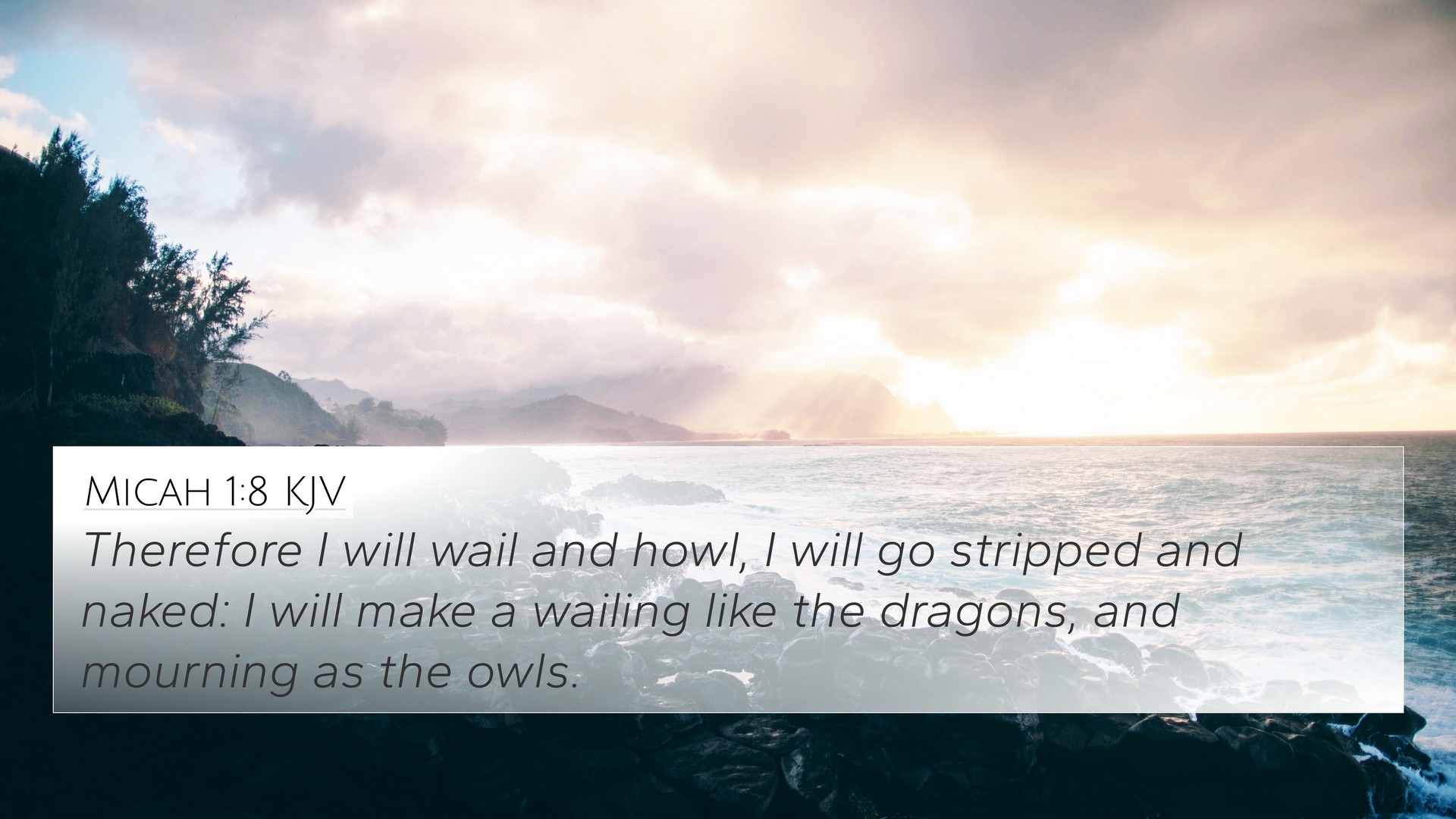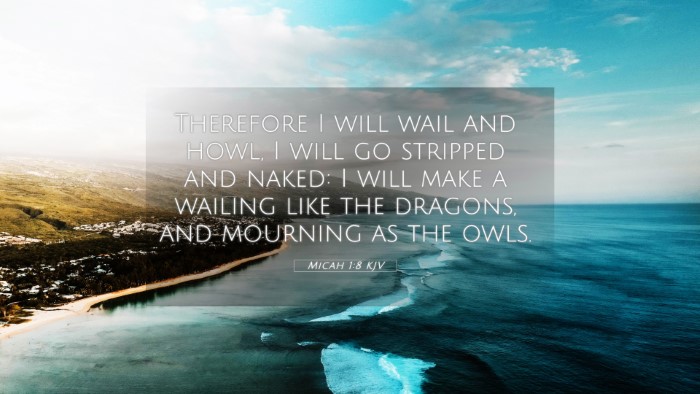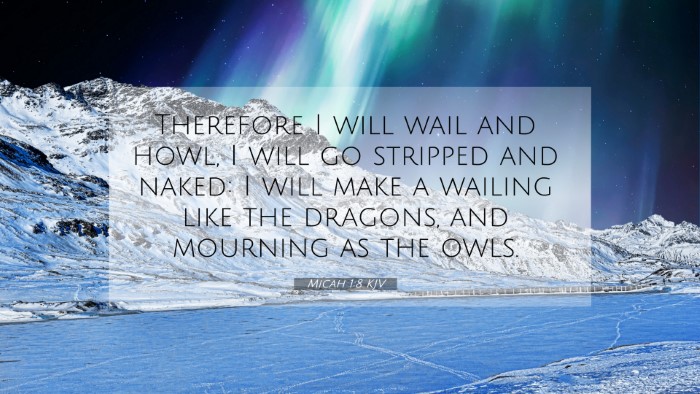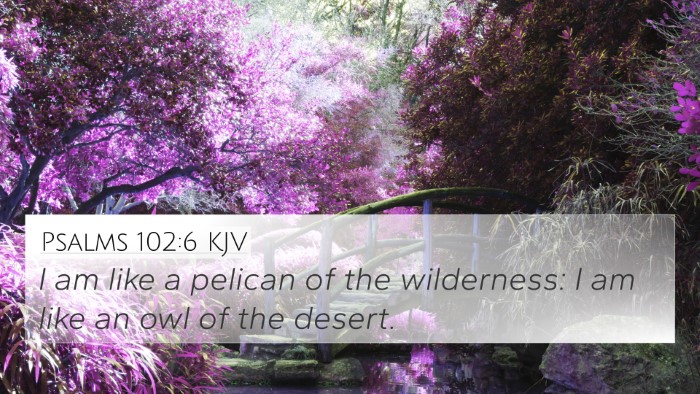Old Testament
Genesis Exodus Leviticus Numbers Deuteronomy Joshua Judges Ruth 1 Samuel 2 Samuel 1 Kings 2 Kings 1 Chronicles 2 Chronicles Ezra Nehemiah Esther Job Psalms Proverbs Ecclesiastes Song of Solomon Isaiah Jeremiah Lamentations Ezekiel Daniel Hosea Joel Amos Obadiah Jonah Micah Nahum Habakkuk Zephaniah Haggai Zechariah MalachiMicah 1:8 Similar Verses
Micah 1:8 Cross References
Therefore I will wail and howl, I will go stripped and naked: I will make a wailing like the dragons, and mourning as the owls.
Uncover the Rich Themes and Topics of This Bible Verse
Listed below are the Bible themes associated with Micah 1:8. We invite you to explore each theme to gain deeper insights into the Scriptures.
Micah 1:8 Cross Reference Verses
This section features a detailed cross-reference designed to enrich your understanding of the Scriptures. Below, you will find carefully selected verses that echo the themes and teachings related to Micah 1:8 KJV. Click on any image to explore detailed analyses of related Bible verses and uncover deeper theological insights.
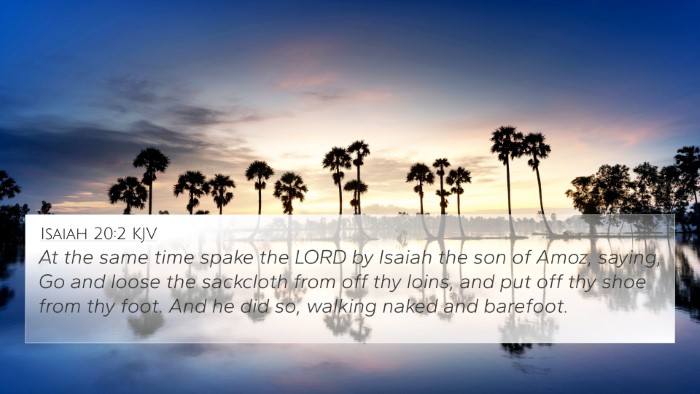
Isaiah 20:2 (KJV) »
At the same time spake the LORD by Isaiah the son of Amoz, saying, Go and loose the sackcloth from off thy loins, and put off thy shoe from thy foot. And he did so, walking naked and barefoot.
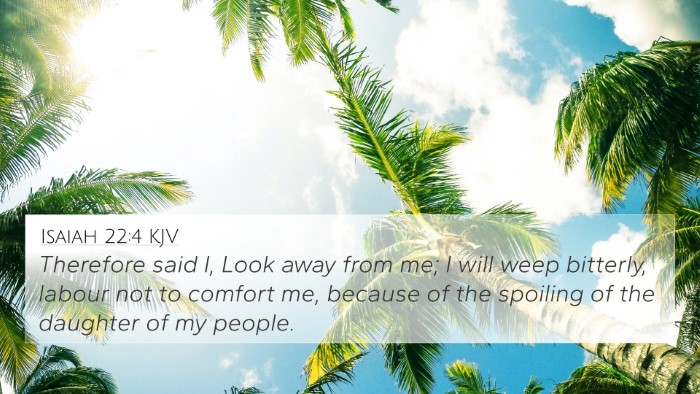
Isaiah 22:4 (KJV) »
Therefore said I, Look away from me; I will weep bitterly, labour not to comfort me, because of the spoiling of the daughter of my people.
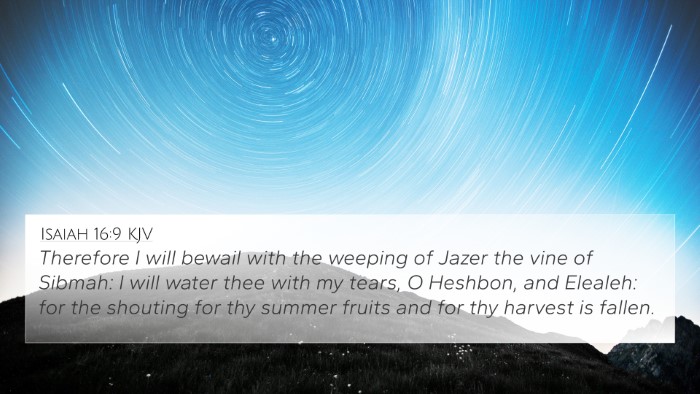
Isaiah 16:9 (KJV) »
Therefore I will bewail with the weeping of Jazer the vine of Sibmah: I will water thee with my tears, O Heshbon, and Elealeh: for the shouting for thy summer fruits and for thy harvest is fallen.
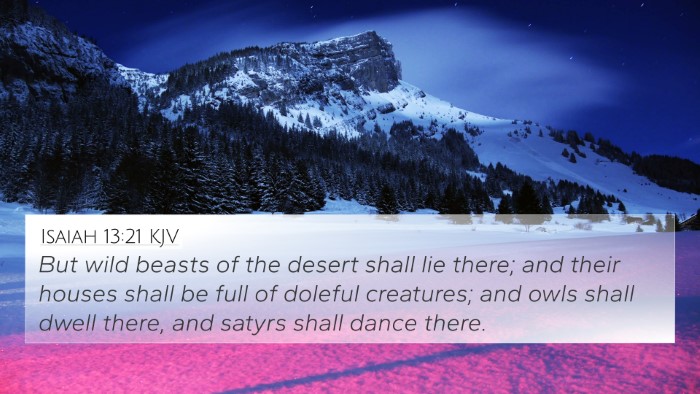
Isaiah 13:21 (KJV) »
But wild beasts of the desert shall lie there; and their houses shall be full of doleful creatures; and owls shall dwell there, and satyrs shall dance there.
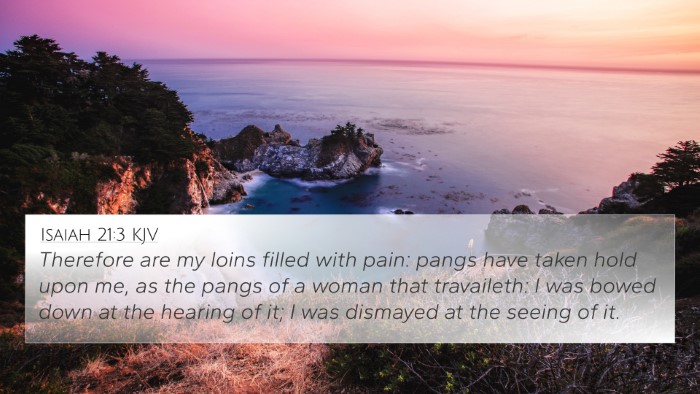
Isaiah 21:3 (KJV) »
Therefore are my loins filled with pain: pangs have taken hold upon me, as the pangs of a woman that travaileth: I was bowed down at the hearing of it; I was dismayed at the seeing of it.
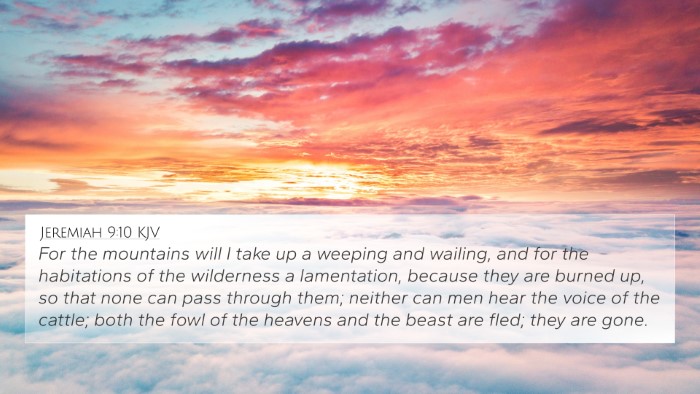
Jeremiah 9:10 (KJV) »
For the mountains will I take up a weeping and wailing, and for the habitations of the wilderness a lamentation, because they are burned up, so that none can pass through them; neither can men hear the voice of the cattle; both the fowl of the heavens and the beast are fled; they are gone.
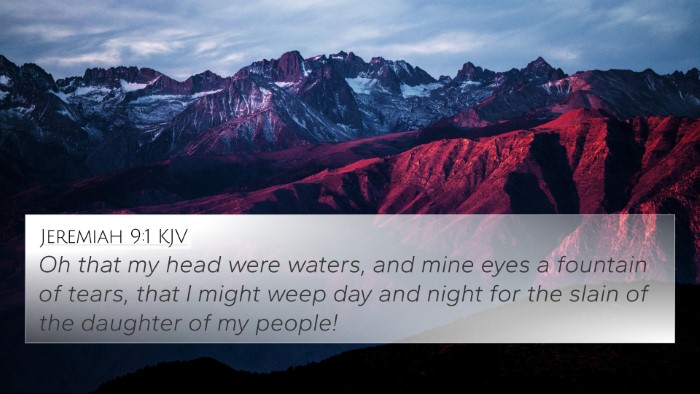
Jeremiah 9:1 (KJV) »
Oh that my head were waters, and mine eyes a fountain of tears, that I might weep day and night for the slain of the daughter of my people!
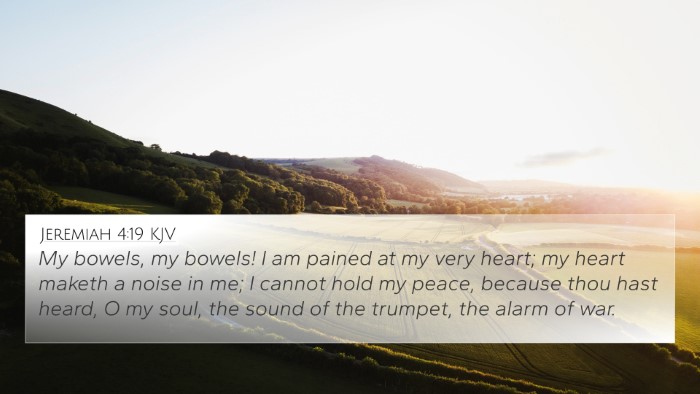
Jeremiah 4:19 (KJV) »
My bowels, my bowels! I am pained at my very heart; my heart maketh a noise in me; I cannot hold my peace, because thou hast heard, O my soul, the sound of the trumpet, the alarm of war.
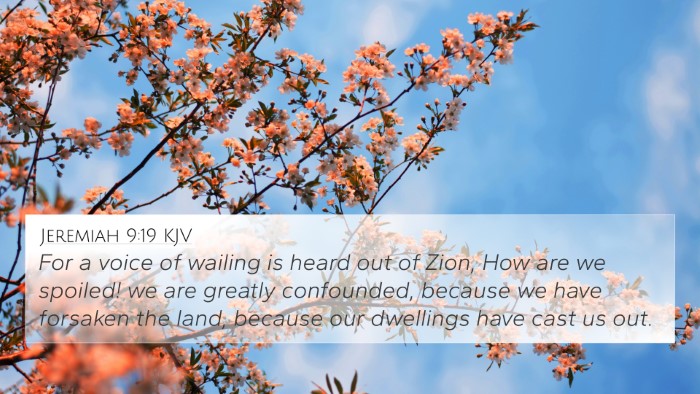
Jeremiah 9:19 (KJV) »
For a voice of wailing is heard out of Zion, How are we spoiled! we are greatly confounded, because we have forsaken the land, because our dwellings have cast us out.

Jeremiah 48:36 (KJV) »
Therefore mine heart shall sound for Moab like pipes, and mine heart shall sound like pipes for the men of Kirheres: because the riches that he hath gotten are perished.
Micah 1:8 Verse Analysis and Similar Verses
Understanding Micah 1:8
Verse: Micah 1:8 (KJV) - "Therefore I will wail and howl, I will go stripped and naked: I will make a wailing like the dragons, and mourn as the owls."
Summary of Meaning
The verse Micah 1:8 captures the profound sense of grief and despair experienced by the prophet Micah in response to the impending judgments on Israel. This visceral expression of mourning serves multiple purposes, including a call for repentance, a demonstration of the weight of sin, and an acknowledgment of the tragic loss that will come as a result of turning away from God.
Commentary Insights
Matthew Henry Commentary
Henry describes Micah’s actions of mourning as indicative of both personal and communal grief. He emphasizes that the symbol of being "stripped and naked" represents the loss of security and dignity, making it a vivid metaphor for the desolate state of Israel due to sin. This mourning is not merely for personal loss, but for the collective downfall of a nation.
Albert Barnes' Notes on the Bible
Barnes elaborates on the imagery of "wail and howl," signifying deep emotional distress. He highlights that the reference to "dragons" and "owls" suggests a night of darkness and sorrow, reflecting the overwhelming nature of the judgment to come. Barnes interprets this as a prophetic warning of the desolation that will befall the land, urging listeners to repent before it is too late.
Adam Clarke Commentary
Clarke points to the cultural significance of the actions Micah describes. The practice of mourning publicly, especially in a state of undress, was common in ancient times as a sign of deep sorrow. He discusses that Micah’s mourning signifies his role as a prophet who intercedes for his nation, visually demonstrating the gravity of their situation. Clarke also draws attention to how Micah's wailing serves as a stark contrast to the false security held by the people.
Bible Cross-References
- Jeremiah 9:17-18: Calls for mourning and signifies national loss.
- Lamentations 3:48-49: Shares profound sorrow and lament for the people.
- Ezekiel 21:6-7: A prophecy of mourning for the impending disaster.
- Isaiah 15:2: Expresses mourning for the destruction of Moab.
- Hosea 9:4: Reflects sorrow for the consequences due to sin.
- Matthew 5:4: "Blessed are those who mourn," connecting mourning with spiritual comfort.
- Revelation 18:18: Mourning over the fall of Babylon, reminiscent of national sorrow.
Connections to Other Bible Verses
The thematic connections between Micah 1:8 and other scripture highlight the larger narrative of repentance and reconciliation found throughout the Bible. Each cross-reference provides a deeper understanding of God’s call for His people to recognize sin, endure sorrow, and ultimately hope for restoration.
Exploring Themes through Cross-Referencing
Using tools for Bible cross-referencing, such as concordances and cross-reference guides, can enhance the study of the themes presented in Micah 1:8. Here are some tools to assist:
- Bible Concordance
- Bible Cross-Reference Guide
- Cross-reference Bible Study Tools
Practical Application
The suffering expressed in Micah 1:8 leads to a call for reflection on personal and communal sin. As believers, it is essential to recognize how such themes resonate today. When faced with difficulties, understanding our collective responsibility and engaging in heartfelt mourning for our nation and its ways can lead us back to God’s grace.
Conclusion
Micah 1:8 serves as a powerful reminder of the emotional and spiritual implications of sin and the call to repentance. By interlinking this verse with the broader context of scripture, one can arrive at a comprehensive view of God’s message of mercy amid judgment. This structured approach to studying Bible verses encourages deeper spiritual engagement and fosters a richer understanding of biblical truths.
